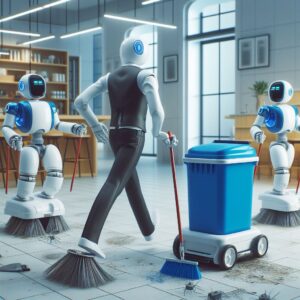Introduction:
The hospitality industry, renowned for its commitment to exceptional guest experiences, is witnessing a transformative shift in its approach to cleanliness and safety with the introduction of sanitation robots. In the wake of global health concerns, these intelligent machines have emerged as key players in maintaining stringent hygiene standards. In this article, we will explore the role of sanitation robots in the hospitality industry and how they are revolutionizing the way hotels
Automated Disinfection Processes:
Sanitation robots bring automation to the forefront of cleanliness in the hospitality sector. Equipped with advanced disinfection technologies such as UV-C light, these robots navigate through designated areas, effectively eliminating harmful pathogens. The automated nature of these robots ensures a thorough and consistent disinfection process, minimizing the risk of human error and enhancing the overall safety of the environment.
UV-C Light Technology: Germicidal Power Unleashed:
Many sanitation robots in the hospitality industry leverage UV-C light technology for disinfection. UV-C light has proven germicidal properties, capable of deactivating the DNA and RNA of microorganisms, including bacteria and viruses. Sanitation robots equipped with UV-C light can access hard-to-reach areas, providing a comprehensive and efficient sanitization solution that complements traditional cleaning practices.
Efficient and Time-Saving:
Sanitation robots contribute to efficiency and time savings in the hospitality sector. With the ability to work autonomously, these robots can cover large areas quickly, allowing staff to focus on other essential tasks. This not only streamlines the cleaning process.
Enhanced Guest Confidence:
In the current global landscape, guests are increasingly prioritizing safety and cleanliness when choosing accommodation. Sanitation robots play a crucial role in building guest confidence by visibly demonstrating a commitment to hygiene. The presence of these robots in hotels and resorts communicates a proactive approach to maintaining a clean and safe environment, thereby fostering trust among patrons.
Real-Time Monitoring and Reporting:
Modern sanitation robots often come equipped with sensors and connectivity features that enable real-time monitoring and reporting. Operators can track the robot’s movements, verify completed disinfection tasks, and receive instant notifications in case of any anomalies. This level of transparency not only ensures accountability but also provides valuable data for continuous improvement in sanitation practices.
Customizable Solutions for Different Spaces:
Sanitation robots are designed to adapt to various spaces within the hospitality industry. From hotel rooms and lobbies to conference halls and dining areas, these robots can be programmed to navigate specific environments efficiently. The ability to customize the robot’s routes and disinfection parameters.
Conclusion:
Sanitation robots have emerged as indispensable assets in the hospitality industry, offering a sophisticated and automated approach to cleanliness and safety. As hotels and resorts embrace these technological solutions, they not only elevate hygiene standards. The integration of underscores the industry’s commitment to innovation and proactive measures.
For more Article like this, visit our Website Here

